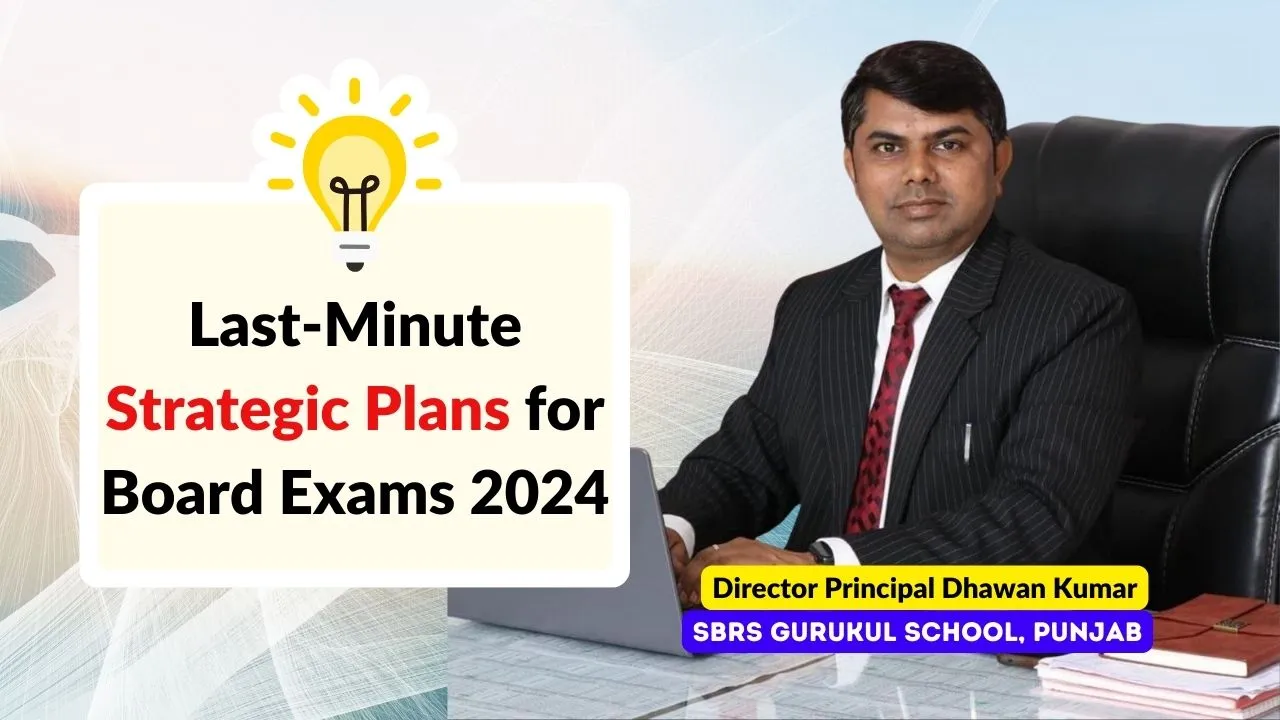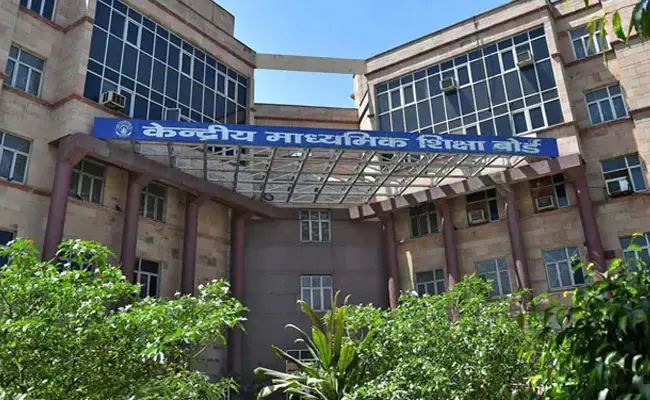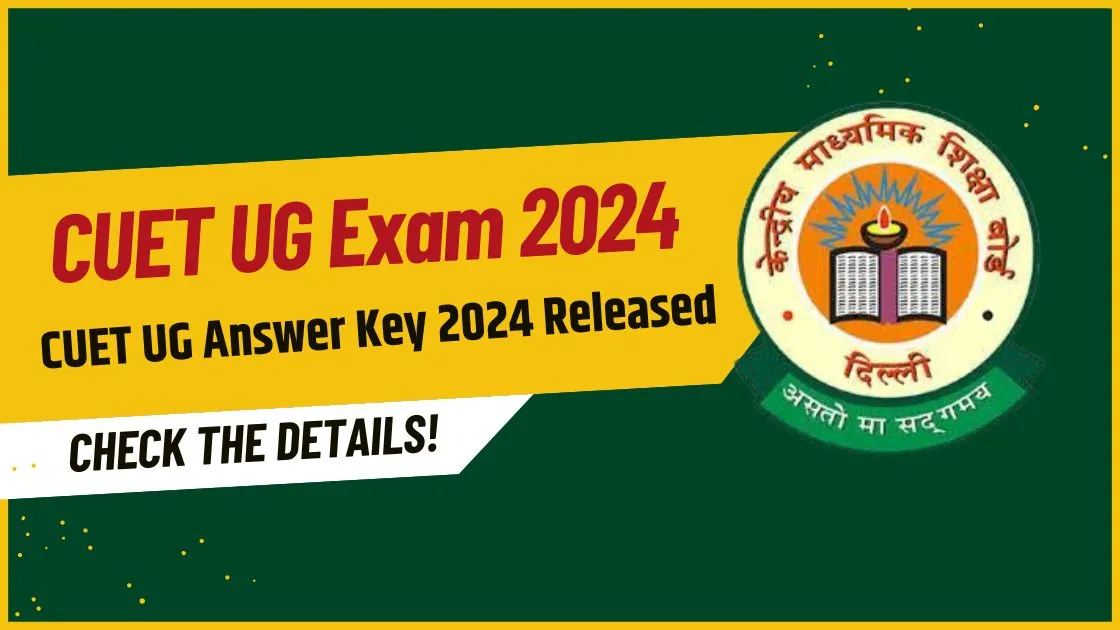Last-Minute Strategic Plans and Tips for Board Exams 2024
CBSE Board Exam Expert Director Principal Mr. Dhawan Kumar SBRS Gurukul School Moga
Board Exam Tips: Consistency is what transforms average into excellence. These wise words encapsulate the need to persevere and be consistent to succeed in any endeavor. They are especially relevant for students preparing for the Class 10/12 CBSE board exams 2024.
Students are actively getting ready for the CBSE Board Exam 2024.
CBSE Board exams have always had a ring of anxiety and nervousness, and with very little time left for examinations to begin, now is the time for students to remain calm, composed, and thoroughly prepared.
No magic formula can guarantee success in CBSE board exams, but here are some tips to help students gain confidence and score well.
Every Subject/Topic Counts
It is wise to prioritize revising topics of higher weightage, but focusing only on them is a big mistake. All chapters and subjects are essential.
It’s better to distribute your time evenly among all subjects/topics rather than concentrating solely on a few. It is best not to be surprised when a question pops up from the chapters that one didn’t consider necessary enough to revise.
Study All Topics: Don’t just focus on the main subjects. Study everything to avoid surprises in the exam.
Follow a Timetable
The timetable is not just to divide the time for subjects. It’s quite the opposite. Boards are stressful, and the most important thing for students during this time is to have proper sleep, food, and enough free time to keep their minds active and healthy.
Studying late at night can disturb your body’s natural rhythm, so adjusting it for peak brain performance during exams is important. Remember to wear masks and follow safety measures like getting vaccinated and sanitizing. Falling sick during exams is something you want to avoid!
Make a Schedule: Create a daily plan. Include time for sleep, meals, and breaks to keep your mind fresh.
Refer to the Right Study Material
Choosing suitable study material is essential to score well on CBSE final exams. NCERT books are a must-read for all students, as most exam questions are based on them.
Apart from NCERT books, you can also refer to reference books, guides, and previous years’ question papers. This will give you a better understanding of the exam pattern and the types of questions asked.
Use Good Materials: Read your NCERT books first. Then look at other books and past papers to understand the exam better.
Practice Previous Year Question Papers
Practicing previous years’ question papers is an important aspect of exam preparation, as it provides students with a clear idea of the exam pattern, the types of questions that may be asked, and the time management required to complete the paper.
By solving these papers, students can clearly understand where they need to focus their attention and prepare accordingly. They can identify the essential topics and concepts frequently asked in the exam and manage their time effectively during the exam.
Practice Old Papers: Solve previous year’s papers to get used to the exam pattern and manage your time well.
Time Management
Effective time management is essential for board exam success. With limited time to answer questions, students must manage their time effectively to ensure they can answer all the questions within the allotted time.
One of the most effective strategies for time management is to create a study schedule that outlines the time allocated for each subject and topic. Students should prioritize the topics that they are weak in and allocate more time to these topics to improve their understanding.
Additionally, they should set aside sufficient time for revision and solving previous years’ question papers.
During the exam, it is important to manage time effectively. Students should read the instructions carefully and allocate time for each question based on the marks assigned.
Manage Time Well: Plan how much time to spend on each question in the exam to answer all questions.
Write Neatly
Writing neatly is an important aspect of exam preparation that students often overlook. Writing neatly can help students convey their ideas, improve their grades, and reduce the risk of misinterpretation by examiners. Students should ensure their writing is legible and easy to read when writing answers.
They should also underline or highlight key points to make them stand out and ensure that the examiner can easily identify the important aspects of their answer. Writing neatly can also help reduce exam stress and anxiety, giving students control over their performance.
Write Clearly: Make sure your handwriting is easy to read. Highlight important points in your answers.
Maintain Your Writing Speed
Maintaining writing speed is an essential aspect of exam preparation that can significantly impact a student’s performance. In an exam, students are typically given limited time to answer many questions.
Students should also practice time management by allocating sufficient time for each question, based on the marks assigned. They should avoid spending too much time on a single question and move on to the next question if they are unsure about the answer.
KVS Support Materials (All Subjects) for Class XII Students
Don’t Over-Study
Over-studying a few days before exams can be counterproductive and harm a student’s performance. It is natural for students to feel anxious and stressed before exams, but excessive studying can lead to burnout and fatigue, ultimately harming their exam performance.
Over-studying can also lead to information overload and make it difficult for students to recall important information during the exam. Instead of over-studying, students should focus on revising key concepts and practicing previous years’ question papers.
They should also take breaks between study sessions, get sufficient rest, and engage in relaxing activities like meditation or exercise to reduce stress and improve their mental well-being.
Don’t Cram: Avoid studying too much just before the exam. It’s better to review what you know and relax.
Stay Calm and Focused
Staying calm and focused before appearing for an exam is essential for achieving success. It is natural for students to feel anxious and stressed before an exam, but it is important to manage these emotions to ensure they do not affect their performance.
Staying calm and focused can help students think, recall information more easily, and perform to the best of their abilities.
One of the most effective strategies for staying calm and focused is to prepare well in advance. Students should ensure they have thoroughly covered the entire syllabus, revised, and solved previous years’ question papers. This can help build their confidence and reduce exam anxiety.
Additionally, students should get sufficient rest, eat a healthy meal, and avoid consuming caffeine or energy drinks before the exam. They should arrive at the exam center well before the start time to avoid last-minute stress and familiarize themselves with the environment.
During the exam, it is important to stay focused on the task at hand. Students should read the instructions carefully and allocate time for each question based on the marks assigned.
They should avoid getting distracted by other students or external factors and focus solely on answering the questions to the best of their abilities. By staying calm and focused, students can optimize their performance and achieve desired results.
Exams measure persistence, hard effort, devotion, and perseverance rather than knowledge. I wish you well on your forthcoming CBSE Board Exams. You’ll succeed, I have no doubt. – Pr. Dhawan Kumar
Related queries asked by students and answered by exam expert
When should I start revising for my CBSE board exams?
Start revising as early as possible, ideally a few months before the exams start.
Is NCERT enough for CBSE board exams?
Yes, NCERT books cover most of the exam material, but reviewing additional resources can help.
How many hours should I study each day?
This varies for each student, but aim for a balanced schedule with 6-8 hours of study and enough rest.
Do I need to write long answers to score well?
Not necessarily. Focus on writing clear, concise, and relevant answers.
What should I do if I get stressed during the exam?
Take deep breaths, stay calm, and focus on the question in front of you. Remember, it’s okay to take a moment to relax.
CBSE Sample Papers | CBSE Circulars | Quizzes | Study Material
Click Here to Join our Premium Telegram for More News and Updates.
Download ShikshaPress App For Free Educational Updates
For the Latest Educational News (CBSE, ICSE, and State Board News) and live news updates, like us on Facebook or follow us on Twitter and Join our Premium Telegram Channel. Read more on Latest Exams & Results News on Shikshapress.com.






